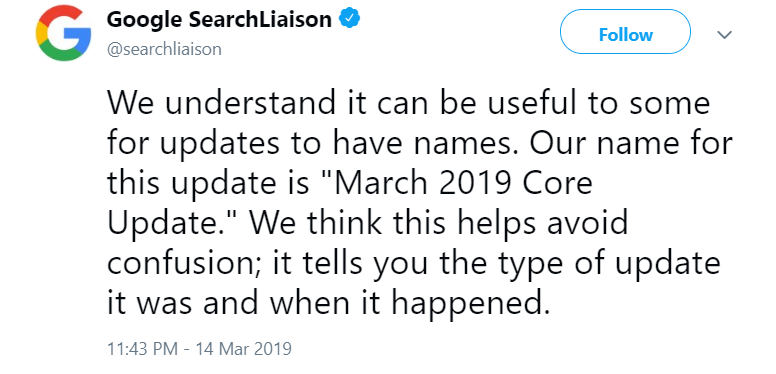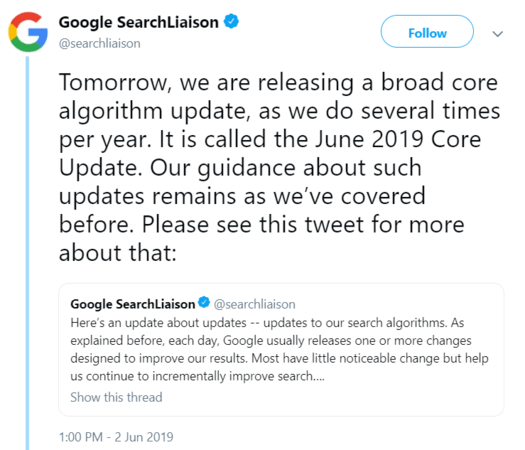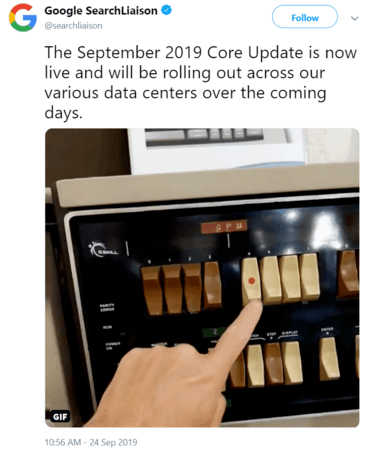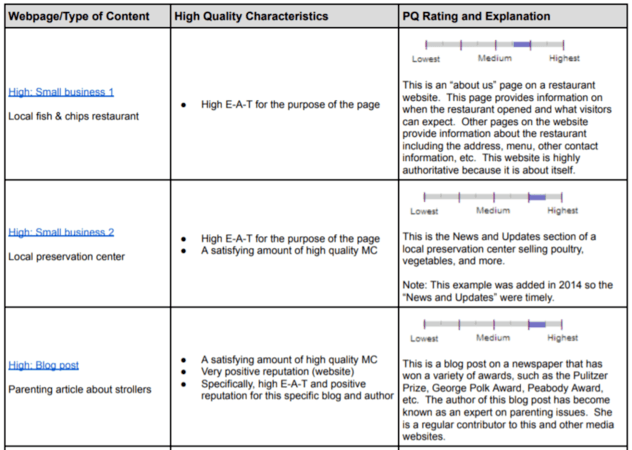-
 9 min. read
9 min. read
-
 Sarah Berry
Sarah Berry Web Marketing Consultant
Web Marketing Consultant
- Sarah Berry is a Google Analytics-certified Web Marketing Consultant at WebFX. She’s written over 400 articles on digital marketing, covering topics like SEO, CRO, and Amazon. When she isn’t polishing her Time Magazine Person of the Year Award, she’s spending time with her flock of ducks.
With more than two trillion searches each year and a more than 20-year history as a search engine, it’s no surprise that Google updates its algorithm often. Just last year, the search engine launched more than 3000 changes to Google Search. And this year, Google began publishing (and talking about) Google core updates.
What is a Google core update? Unlike other launches, a Google core update makes significant and broad changes to the company’s search algorithm and systems. While most launches go unnoticed, core updates get attention because people notice their effect on search results.
Keep reading to learn more about these updates to Google’s core algorithms, including examples of the latest ones. Plus, get advice about how to recover from a broad update. If you’d like one-on-one advice tailored to your company, contact us online to speak with a strategist or give us a call at 888-601-5359!
What is a Google core update?
A Google core update happens when Google makes significant and broad changes to its search engine algorithm and systems.
These updates aim to improve the search experience for users, providing more relevant, useful, and trustworthy content. Usually, core updates happen several times a year and receive confirmation from Google.
3 examples of Google core updates
A few examples of some updates to Google’s core search engine algorithm include:
1. March 2019 Core Update
In early March 2019, Google released the March 2019 Core Update.  While Google didn’t release specific details about the update, industry research suggested that sites with low-quality content noticed the biggest change with decreased rankings and traffic. The same study found that most websites affected by the update worked to improve their content.
While Google didn’t release specific details about the update, industry research suggested that sites with low-quality content noticed the biggest change with decreased rankings and traffic. The same study found that most websites affected by the update worked to improve their content.
2. June 2019 Core Update
In early June 2019, Google released the June 2019 Core Update.  According to Google, the update mimicked other core updates and didn’t offer anything “big” like past broad updates on page speed. Google did recommend, however, that users read its 2011 blog post, “More guidance on building high-quality sites,” to learn how to improve their sites for the long-term.
According to Google, the update mimicked other core updates and didn’t offer anything “big” like past broad updates on page speed. Google did recommend, however, that users read its 2011 blog post, “More guidance on building high-quality sites,” to learn how to improve their sites for the long-term.
3. September 2019 Core Update
 In late September 2019, Google released the September 2019 Core Update. Webmasters that commented about the update mentioned seeing a negative impact from the June 2019 Core Update, but then getting increases in rankings and traffic following the September 2019 Core Update. Some also commented that many healthcare and news sites were affected.
In late September 2019, Google released the September 2019 Core Update. Webmasters that commented about the update mentioned seeing a negative impact from the June 2019 Core Update, but then getting increases in rankings and traffic following the September 2019 Core Update. Some also commented that many healthcare and news sites were affected.
As you can tell, Google’s core updates rarely come with details. That’s because the updates often affect a range of ranking factors versus a single one. Plus, to prevent spammers and black-hat SEO, Google must protect the workings of its search engine algorithm.
How often do Google core updates happen?
In most cases, core Google Search updates happen several times per year, usually every few months.
Google tends to announce the updates a few days before or the day of, though some updates can take several days to roll out for users. ![]() You can check for core updates a few ways:
You can check for core updates a few ways:
- Follow Google SearchLiaison on Twitter
- Use free algorithm monitoring tools like RankRanger and AccuRanker
In some cases, you can even subscribe for updates, like with AccuRanker (which is also a Google position checker), to stay up to date.
How is a Google core update different from other updates?
“Google core updates are like a list of recommendations for TV shows to watch. Recommendations change from year to year as new shows come out and old shows retire to keep the list relevant and up to date.”
A Google core update differs from other Google updates for a few reasons, including:
- Google announces core updates, but not other algorithm updates
- Google acknowledges core updates, but not other algorithm updates
- Google names core updates, but not other algorithm updates
The design of core updates also stands apart from regular Google updates. With a core update, Google tweaks multiple features of its search algorithm in ways that can make search results more relevant and helpful across industries and user intents. These are broad and noticeable changes, versus updates that may go unnoticed.
You can think about a core update like a list of recommendations for TV shows to watch this fall. Your recommendations will change from year to year as new shows come out and old shows retire. Updating your suggestions, just like a core update, keeps your advice relevant and up to date.
2 signs a Google core update affected your website
If you’re worried a Google core update impacted your website negatively, look for these signs.
Decreased rankings
When a broad Google update happens, SEOs often look at search engine results pages (SERPs).
Your rankings in SERPs can provide you with insight into whether a core update hurts or helps your site. Keep in mind that you’ll want to monitor your rankings for several days before drawing a conclusion about its effect. You can check your rankings a few ways, including with the following tools:
For the best results, look at your rankings for various keywords, including ones with different intents. Check your rankings for an informational keyword like “how to bathe a cat,” and a transactional keyword like “cat shampoo and conditioner,” for example.
Decreased traffic
You can also spot a core Google update by looking at your organic traffic. If your rankings in search results drop, you will lose traffic.
You may see a dramatic drop in traffic depending on your before and after rankings, as the first five positions on Google claim 68% of all clicks. Use Google Analytics to check your site traffic. You’ll want to compare your traffic year-over-year.
While you can look at your site-wide traffic, take the time to look at individual page traffic too. You may also want to review other performance metrics, like bounce rate. Once you determine that a broad Google Search update impacted your site, you can start making improvements to your website.
If you need help getting started, you can always invest in an SEO audit or consultation.
Pssst! Want to stay on top of Google’s algorithm, even when there isn’t an update? Check out our helpful Google cheat sheet to stay in the loop:
How to recover from a Google core update
Do you think a Google core update impacted your website?
You can take a few steps to help your website recover and earn back its rankings (and then some):
Review Google’s quality rater guidelines
Before you start crawling your site and looking for issues, step back and read Google’s search quality rater guidelines. These guidelines detail what Google wants and expects from websites, as well as how Google looks for Expertise, Authoritativeness, and Trustworthiness, or E-A-T.  Take notes while you review the guidelines and use what you learn in the next step.
Take notes while you review the guidelines and use what you learn in the next step.
Assess your current content
Next, you want to look at your content.
Depending on your website’s size, you may focus on your most valuable pages, or, you may look at all the content on your site. If you noticed that the core update only impacted some of your content, look at content that was and wasn’t affected. Google recommends asking four types of questions when looking at your content:
- Content and quality
- Expertise
- Presentation and production
- Comparative
Learn more about these questions in the table below:
| Question Type | Questions |
|---|---|
| Content and quality | Is the content original? Does the content offer information beyond the obvious? Is the headline descriptive and helpful? Would you bookmark or share this page? |
| Expertise | Does the content have factual errors? Would you trust the content for decisions related to your money or your life? Did an expert or topic enthusiast write the content? |
| Presentation and production | Does the content have spelling errors? Does the content have excessive ads? Does the content display on mobile devices? Does the content appear sloppy? |
| Comparative | Is the content offering substantial value when compared to similar pages? Does the content serve the interest of visitors or webmasters? |
Your answers will help you gauge the current quality of your content.
Offer your readers the best content possible
Once you assess your content and answer the above questions, you can start making improvements to your content. For a productive process, compile your audited pages and prioritize them from most to least valuable. A service or product page, for instance, may deserve immediate attention over a blog post.
For example, maybe your service page doesn’t compare to other content in the search results. When you look at competitor product pages, you see the value that they offer consumers. In response, you add a product video, as well as content about how to use your product.
You’re offering people helpful and relevant information that makes your site experience 10x better.
Build a powerful backlink profile
Links are one of the most powerful ranking factors when it comes to Google. That’s why it’s worth looking at your backlink profile, or the number of websites linking to your site using a tool like Ahrefs. When a website links to yours, they’re doing it for a reason — like to share top-notch content.
Assessing and updating your content can lead to more links to your site, and high-quality ones too. For Google, links serve as a vote of confidence. Another website is endorsing yours, which tells Google (and its audience) that you have relevant and trustworthy content.
This effect gets amplified when a high-quality and reputable site, like a well-known news site, industry-leading blog, or government website, links to yours. With these four initial steps, you can begin recovering from a broad Google Search update.
Start recovering from a Google core update
SEO takes time, which is why you don’t want to wait when it comes to recovering from a Google core update. You want to start right away by reviewing Google’s standards, auditing your content, improving it, and attracting links to it.
If you need help with taking your website from the bottom of Google’s search results to the top, contact WebFX. With our SEO services, your business can repair your site and rankings, bringing more traffic, leads, and revenue to your company. Contact us online or call us at 888-601-5359 to learn more today!
-
 Sarah Berry is a Google Analytics-certified Web Marketing Consultant at WebFX. She’s written over 400 articles on digital marketing, covering topics like SEO, CRO, and Amazon. When she isn’t polishing her Time Magazine Person of the Year Award, she’s spending time with her flock of ducks.
Sarah Berry is a Google Analytics-certified Web Marketing Consultant at WebFX. She’s written over 400 articles on digital marketing, covering topics like SEO, CRO, and Amazon. When she isn’t polishing her Time Magazine Person of the Year Award, she’s spending time with her flock of ducks. -

WebFX is a full-service marketing agency with 1,100+ client reviews and a 4.9-star rating on Clutch! Find out how our expert team and revenue-accelerating tech can drive results for you! Learn more
Try our free Marketing Calculator
Craft a tailored online marketing strategy! Utilize our free Internet marketing calculator for a custom plan based on your location, reach, timeframe, and budget.
Plan Your Marketing Budget

Maximize Your Marketing ROI
Claim your free eBook packed with proven strategies to boost your marketing efforts.
Get the GuideTry our free Marketing Calculator
Craft a tailored online marketing strategy! Utilize our free Internet marketing calculator for a custom plan based on your location, reach, timeframe, and budget.
Plan Your Marketing Budget





